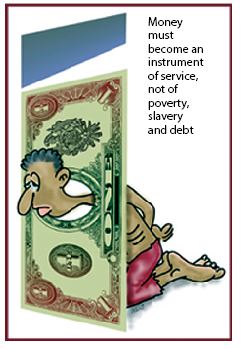 Today when there is no money, everyone stops producing. Even if there are still urgent needs to be met, people are laid off and do nothing.
Today when there is no money, everyone stops producing. Even if there are still urgent needs to be met, people are laid off and do nothing.
Today, when there is no money, municipalities lay aside urgent services requested by the population even though there is everything needed — men and materials — to accomplish all of these projects.
When the money is not there, construction slows down or stops, even if there are still homeless families trying to makes ends meet. Even though bricklayers, carpenters and plumbers are impatiently waiting to be employed.
Social Credit would change all of this radically. Social Credit rejects this subjection of man to finance. It proclaims to the whole world:
“It is money that should be issued in keeping with actual and potential production; and not production which should get in step with money.”
 Money according to goods
Money according to goodsProduction is something concrete and real — houses, food, clothing, shoes and transportation. Production is also water systems, sewers, streets, sidewalks, as well as schools, hospitals and churches.
But what is money? It is just an abstraction or unit of measurement. It is not a reality or commodity. Money is figures on metal discs, pieces of paper or in a bank ledger. It is figures which are accepted as a means of payment.
Since they are a means of payment, figures should be issued as production is made, if one wants production to advance and not let it be restricted due to the scarcity of figures.
Lacking workers or materials to produce could be understandable. But lacking figures to mobilize workers and materials is incomprehensible and inadmissible in a society made up of intelligent beings.
 Money as a servant
Money as a servantSocial Credit tears away the veil which has kept money as something almost sacred and untouchable. It makes money a servant and not a master — a god who dictates, permits and forbids.
Social Credit maintains that: All that is physically possible and legitimately requested must, by this very fact, be made financially possible.
If it is possible to build houses, roads and sewage systems, it must be financially possible to pay for the necessary work and materials to build these things.
If this is not possible, then one must admit that it is the monetary system that masters man and not man who masters the monetary system.
Since money consists of nothing more than engraved or printed figures, or handwritten figures in a bank ledger, it is stupid, criminal and absurd to let families go homeless and towns go without public utilities, simply because of a lack of figures.
Under a Social Credit system, all new production would be financed by new credits and not by credits tied to production that is already created. The credits issued according to the needs of production would be withdrawn and cancelled as consumption takes place.
In other words, the money system would be a mere bookkeeping system. However, it would also be a just system, in keeping with existing conditions. Money would come into being as production is made and money would disappear as production disappears.
Under a Social Credit system, public debt would be unthinkable. What a country provides is real wealth: why then should this wealth be represented as a debt? How is it possible for a country to be burdened with debt for such production, unless its roads, sewers and public buildings were built by foreign countries?
Depressions and privations in front of possibilities are the fruits of a false financial system which dominates instead of serves. And these bad fruits would disappear under a sound financial system, under a Social Credit system.
Financing production is not enough. Goods and services must also reach those who need them. In fact, the only reason for the existence of production is that the goods meet the needs.
Production must be distributed. How is it distributed today and how would it be distributed under a Social Credit system?
Today, goods are put up for sale at a certain price. People who have money buy these goods by paying the required sum. This method allows those who have money to buy the goods which they want and need.
Now, Social Credit would in no way change this method of distributing goods. The method is flexible and good — provided, of course, that the individuals who have needs also have the purchasing power to choose and buy the goods which fill these needs.
Purchasing power in the hands of those who have needs and wants: it is precisely here that the present system is defective. And it is this defect that Social Credit would correct.
When production is financed, it functions. When it functions, it distributes money which is used to finance it. The money is thus distributed in the form of wages, profits and industrial dividends constituting purchasing power for those who receive the allotments. But there are a few flaws in the present system:
In the first place, industry never distributes purchasing power at the same rate that it generates prices.
When a finished good is put on the market, it comes with a price attached to it. But part of the money included in this price was distributed perhaps six months to a year ago, or even more. Another part will be distributed only once the good is sold and the merchant takes out his profit. Another part will perhaps be distributed in ten years, when worn machinery — of which wear is included as an expense in the price — is replaced by new machinery, etc.
Then there are those individuals who receive money and who do not spend it. This money is included in the prices but it is not in the purchasing power of those who need goods.
The repayment of short-term bank loans and the present fiscal system further increase the gap between the prices and the purchasing power. Hence the accumulation of goods, unemployment, and all that ensues from it.
Social Credit would bring order into this chaos. Since it considers money as a bookkeeping system, it would constantly adjust the sum of the prices and the purchasing power so that they would balance. This would involve simple accounting procedures and a balance would be achieved.
In the second place, the production system does not distribute purchasing power to everyone. It distributes it only to those who are employed in production. And the more the production comes from the machine, the less it comes from human labour. Production even increases, whereas required employment decreases. So there is a conflict between progress, that eliminates the need for human labour, and the system, that distributes purchasing power only to the employed.
Yet everybody has the right to live. And everybody is entitled to the basic necessities of life. Earthly goods were created by God for all men and not only for those who are employed, or employable.
That is why Social Credit would do what the present system is not doing. Without in any way disturbing the system of reward for work, it would distribute to every individual a periodical income, called a “social dividend” — an income tied to the individual as such and not to employment.
And as progress would liberate people more and more from employment, the dividend would take a larger part in their purchasing power. The dividend would allow everybody to enjoy the fruits of progress. This would be considering all citizens as shareholders, entitled to a share of the abundant production resulting from progress — which is a common capital — and no longer resulting from individual labour, which is rewarded by wages and salaries.
From this would stem freedom, the freedom for individuals to develop as human beings, without being constantly obliged to seek employment, to produce superfluous goods, or to make those things which serve only to destroy, such as the war industry.
It would put an end to the perpetual worries about the future, in a country where one is certain that goods will be as abundant tomorrow as they are today. What a relief in the lives of individuals and families!
Louis Even